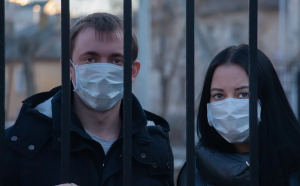The travel industry will undoubtedly never look the same again after the COVID-19 pandemic has passed. When international travel becomes accessible again, travelers can look forward to healthier and safer conditions than ever before.
The travel industry was booming pre-COVID-19: 1.4 billion international tourist arrivals were counted by the UN World Tourism Organization in 2018. However, the current pandemic has now put the global travel industry on hold with many airlines now in debt after government bailouts. While it’s currently unclear when international travel will make a comeback, lawmakers have the opportunity to implement industry-wide changes. The coronavirus relief bill, for example, has put a stop to companies buying back their own stock after it was reported U.S. airlines spent a total of 96% of their free cash flow on share buybacks in the past decade.
Tighter airport security
Just as airport security tightened in the aftermath of September 11, 2001, similar measures will be put in place post-COVID-19. While countries are still deliberating on the safest ways to proceed, it’s expected entry to at least some of them will require COVID-19 testing to be performed within 24 hours before travel (with a negative result). Some countries may not even permit entrance to Europeans and Americans for a period of time after re-opening — at least until a vaccine becomes available.

Travelers may be forced into government-mandated quarantines on arrival or reentry, therefore making travel abroad less accessible to those without ample vacation time. There’s even talk of travelers needing health certifications in order to fly. However, this would likely be a time-consuming process that interrupts existing flight timetables. “It needs to be quick and secure. Something that is a relatively minor burden,” states Dirk-Maarten Molenaar, Amsterdam-based head of Boston Consulting Group.
Prioritizing health
The coronavirus pandemic means travelers are much more likely to opt for health insurance and be motivated to read the fine print on their coverage. Travelers will also be more cautious about their individual hygiene practices to ensure they stay safe and healthy while traveling. For example, frequent handwashing is one of the best and simplest ways to avoid getting sick. Bringing anti-bacterial wipes onto planes and wiping the seat, armrest, and seatbelt, as well as the handles of the bathroom door will likely become the norm. Checking the latest guidelines set by the World Health Organization and Centers for Disease Control and Prevention will become essential.
Cruise ship travel
The cruise ship industry is on track to implement massive industry-wide changes by 2021. The Cruise Lines International Association has partnered with Royal Caribbean, Carnival, and other member cruise lines, as well as the U.S. government, to devise a new set of stricter safety laws. New medical protocols may include “more stringent boarding procedures” — which could include making it mandatory for older travelers to show health certifications, improved monitoring capabilities, routine temperature tests, onboard medical centers, quarantine arrangements, as well as air filtration systems to improve hygiene. Additionally, reservation systems may be strictly implemented for entertainment establishments and dining areas as cruise ships adjust to meet smaller capacity limits.
The travel industry will undoubtedly never look the same again after the COVID-19 pandemic has passed. When international travel becomes accessible again, travelers can look forward to healthier and safer conditions than ever before.


Join the conversation!